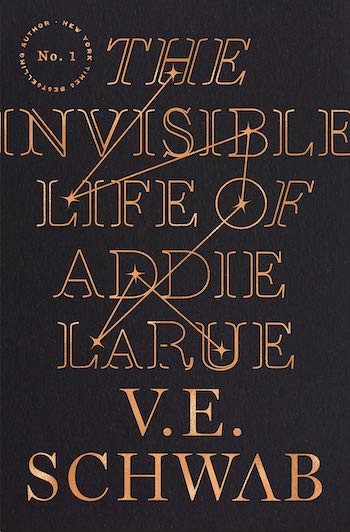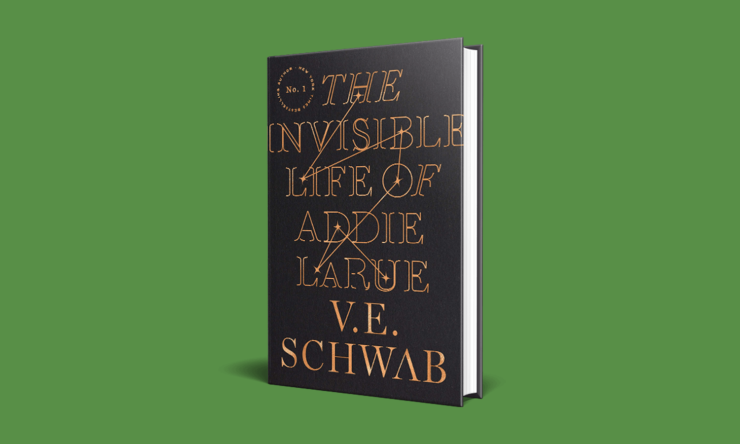Addie had only ever wanted to be free.
Born in 1691, in a small village in France, she was never meant to chart her own course. She was to be a wife and mother, all her curiosities hewn away until she was only a core, and even that wasn’t to be her own.
She hadn’t meant to pray to the old gods after dark.
But he is the only one who answered.
And so Addie embarks on a journey that feels like a curse. She hadn’t wanted to be beholden to the expectations of her era, the rules inscribed on the shape of her body. She just wanted to explore the wonders of the world, to experience the possibilities outside her town.
She had only ever wanted to be free.
Luc granted her wish with a cruel wit older than that of a crossroads demon, a vicious twist on a Faustian bargain. Adeline LaRue is free now, because she can’t be remembered. The moment a person leaves the room, turns away, wakes beside her, she becomes a stranger, again and again. Her parents forget they had a daughter. Her village goes on without her. And as she traverses across France and eventually America, centuries pass and Addie can’t have the intimacy that develops over time. Luc gave her life and health, preserved in her twenty-three-year-old youth, but condemned her to be a perpetual first encounter, an unknown entity. She cannot leave a mark. She can’t write her name, her story. She can’t even break something without leaving it reshaped, unharmed. By asking for freedom, she was made a ghost. Worse, because ghosts are memories and Addie passes through the world without leaving even those.
Buy the Book


The Invisible Life of Addie LaRue
Meanwhile, she herself cannot forget. Her life is palimpsest, a story written over another story not quite obscured beneath, an intrinsic simultaneity. Her village that had been everything to her, fifty years later: the location unchanged, but the entire environment an unfamiliar thing she no longer belongs to. A lover who doesn’t remember her the following day: they don’t know her face, or have a memory of the time they shared, but there might be something of her in the way they shape paint on their canvas, in the emotion they push into their songwriting, in the déjà-vu they might catch in their own laughter. Addie as an echo, a shadow, a myth, a muse.
There are ways in which this means she loses herself. To be free from both consequences and security means Addie has to do what she can to survive, to take what she needs where she finds it. And then it becomes what she wants, too, making a strange best out of her fate as much as she can, clothes and hotel rooms and people, brightening her days before she’s lost to them forever.
Until she finds a boy from a bookshop who remembers what she took. Until it’s three hundred years since Addie’s bargain, and Henry Strauss is the first person she’s ever met who isn’t beholden to her curse. He looks so much like the darkness that haunts her but he’s human instead, and so nothing like Luc at all. He’s thoughtful, and kind, and he’s so curious about the world and the many paths a life can take that he can’t choose any of them, and he just wants to be enough, for his family, for his friends, for himself. And he remembers Addie. After she takes a book from his shop. When she meets him for a first date. The morning after, and the morning after that. And Addie doesn’t know if Luc made a mistake or it’s a trick or a bright, shining loophole, but it’s messy (his friends can’t remember her) and hard (she hasn’t had to be good to a person day after day in three hundred years) and perhaps the most beautiful thing she’s ever done with her very long life.
I don’t want to say this book exemplifies a writer at the top of her game, because anyone who’s read Schwab’s other books knows, she just hits peak after peak. It feels unfair to relegate any of her other masterpieces as a part of an ascent, and I so look forward to her future work already. But Addie does feel like a career triumph. Like an author stretching out, exhaling, expanding, taking the scope to tell a different sort of story. You don’t need to have read Schwab’s other books to enjoy Addie—it’s a great introduction to her work—but the many fans who go into this book with expectations will find them thoroughly met and more. Her propulsive, lyric prose is here, her morally complex, entrancing characters, her unique shape of magic, all wrought within this entirely fresh premise that will no doubt become a long-lasting favorite.
The Invisible Life of Addie LaRue weaves wonderings of art, of influence, of storytelling and legacy and the question of what we are to each other, all within a deliciously haunting queer fairytale. The central love story is m/f, but both leads, though their sexualities aren’t labeled, are queer, bi, or pan, and their relationship is not a straight one. Schwab evokes Hades and Persephone, Orpheus and Eurydice, Sisyphus and more to craft a new mythology all her own. Addie defies genre, blending romance and history, fantasy and monstrosity, cresting through peaks of time, centered on a young (and also, technically very old) woman with both less and more agency than anyone alive.
Life is long when you’re lonely, and impossibly short when you’re not. And so much of who we are is tied to who we are to others. Addie asks, is anything real if it’s not remembered? Because the thing is, humans forget everything. We build imperfect memories into art and story, and in that way a version of us endures, though not necessarily the truest one. There is no such thing as life or love without an ending. But that doesn’t mean it doesn’t matter. That doesn’t mean it doesn’t change us. The Invisible Life of Addie LaRue is romantic, ambitious, and defiantly, deliberately hopeful. Epic and intimate at once, it asks what art is. What it can be, what it saves, what it distorts, what it inspires, and what it can’t capture.
V.E. Schwab is simply one of the most skilled writers working in her genre. This is a clever premise, executed brilliantly. The feat of this book is frankly awe-inspiring. She renders our world so clearly we recognize it, and then fills in the corners, the cracks, so that it feels as if the very air around us brims with her own specific magic, and we might just see it if we know where to look. I am a lifelong New Yorker, and the way she writes my city makes me see it in an entirely new, wondrous light. That’s what she does—she shows us our world, tells us there’s curses and magic written within its very making, that there’s meaning to our myths and our gods, and I believe her.
This book feels timeless, in that exquisite way Schwab books very often do, especially with its roots in eighteenth-century France and its branches spanning up into a very recent New York City. But it’s also almost viciously timely. By giving us someone who for so long can’t leave a mark, Schwab makes it sparklingly clear how much of an impact we can have, every day, and how wild and powerful that is.
Here, as the world feels like it’s ending for so many of us, when we have to be apart from our loved ones more than ever before, when we don’t know what the future looks like, when we don’t know how much worse it will get or how much time we have left—Addie reminds us that it is worth it, to live. That no life is easy or wholly good. And sometimes it’s so much worse than we thought it would be, sometimes there are impossible choices with trick answers and sometimes we are the monsters in our own stories, but that doesn’t mean we can forget the good we can do for each other! When everything feels either tragically impermanent or interminably cruel, what we have is the beauty we can find in the world and those we share it with, and it can be found. In a sunlit city day, in the sailboats set out to the horizon. In the shapes we find in the ghosts of the stars, in how we’re drawn to make sand castles even on an ever-shifting shore. In a home-cooked meal, or the comfort of takeout, or the way we can see ourselves within a very good book. In loved ones, imperfect as we all are. Here. Now. And that matters.
That, in fact, is a sort of freedom in and of itself.
The Invisible Life of Addie LaRue is available from Tor Books.
Maya Gittelman is a queer Pilipinx-Jewish diaspora writer and poet. Their cultural criticism has been published on The Body is Not An Apology and The Dot and Line. Formerly the events and special projects manager at a Manhattan branch of Barnes & Noble, she now works in independent publishing, and is currently at work on a novel.










